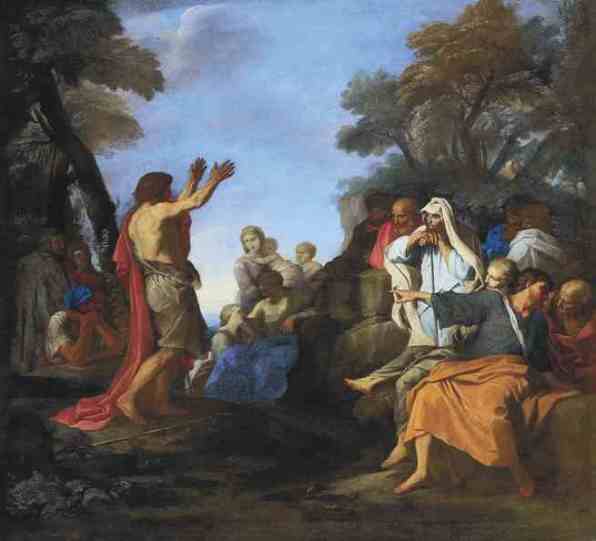DAILY MEDITATION: “He must increase; I must decrease.”
Liturgical day: Saturday after Epiphany
 Gospel text (Jn 3,22-30): Jesus and his disciples went into the region of Judea, where he spent some time with them baptizing. John was also baptizing in Aenon near Salim, because there was an abundance of water there, and people came to be baptized, for John had not yet been imprisoned.
Gospel text (Jn 3,22-30): Jesus and his disciples went into the region of Judea, where he spent some time with them baptizing. John was also baptizing in Aenon near Salim, because there was an abundance of water there, and people came to be baptized, for John had not yet been imprisoned.
Now a dispute arose between the disciples of John and a Jew about ceremonial washings. So they came to John and said to him, “Rabbi, the one who was with you across the Jordan, to whom you testified, here he is baptizing and everyone is coming to him.” John answered and said, “No one can receive anything except what has been given him from heaven. You yourselves can testify that I said [that] I am not the Messiah, but that I was sent before him. The one who has the bride is the bridegroom; the best man, who stands and listens for him, rejoices greatly at the bridegroom’s voice. So this joy of mine has been made complete. He must increase; I must decrease.”
“He must increase; I must decrease.”
Fr. Antoni CAROL i Hostench
(Sant Cugat del Vallès, Barcelona, Spain)
Today, we are surprised to see both Jesus and John baptizing "side by side". We say "side by side", although… actually, this is only in appearance, because John the Baptist refers us to Jesus, who is the Messiah, the "new Moses", the long-awaited Prophet, he who comes over to bring God to us. “What has He [Jesus] brought? The answer is very simple: God. He has brought God” (Benedict XVI).
Consequently, and immediately, John spells out the substance of baptism: in fact, it is purification, but "it differs from the customary religious ablutions» performed those days, and -as Pope Benedict asserted- «it must be the material culmination of a change determining a new way of life forever and ever". Therefore the Christian baptism stands for a radical change under the figure of a new birth. A new beginning in life.
Purification, definitely, but to put off the "old man", to die oneself and -because of God's Grace- be born to a new life altogether: the divine life, something that “No one can receive anything except what has been given him from heaven” (Jn 3, 27). The second council of Orange teaches us that “it is wholly a gift of God to love God. He, who loves, even though he is not loved, allowed himself to be loved. We are loved, even when we displease him, so that we might have means to please him”.
Hence, our long-life task for sanctity: to grow deep in humility, open up God's will for us and let Him guide us. It is not as important what I can do as it is that He leads me: “He must increase; I must decrease.” (Jn 3, 30). And the fuller our joy will grow as the more immaterial I turn into and the Spouse becomes closer to our heart and to our deeds.
Source: evangeli.net
